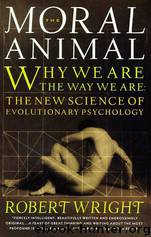The Moral Animal: Evolutionary Psychology and Everyday Life by Robert Wright

Author:Robert Wright [Wright, Robert]
Language: eng
Format: epub
Tags: Human Behavior, Evolution, Behavior Evolution, Sociobiology, Social Ecology, Genetic Psychology, Man
ISBN: 9780679763994
Google: _9bmyrgYSBAC
Amazon: 0679763996
Publisher: Vintage
Published: 1994-01-01T23:00:00+00:00
SICK AND TIRED
The theory that Darwin was slowed by a hostile social climate assumes many forms, ranging from baroque to simple, and these depict his delay in various ways, ranging from pathological to wise.
In the more elaborate versions of the theory, Darwin’s illness—which was never clearly diagnosed and remains a mystery—figures as a psychosomatic procrastination device. Darwin was feeling heart palpitations in September 1837, a couple of months after opening his first evolution notebook, and his reports of illness are fairly frequent as those notebooks unfold toward the theory of natural selection.12
It has been suggested that Emma, who held her religion dear, and was pained by her husband’s evolutionism, heightened the tension between his science and his social environs; and that, by so devotedly nursing him, she made his unwellness easier than was healthy. A letter to Charles just before their marriage contains a passage to that effect: “[N]othing could make me so happy as to feel that I could be of any use or comfort to my own dear Charles when he is not well. If you knew how I long to be with you when you are not well! … So don’t be ill any more my dear Charley till I can be with you to nurse you.…”13 These sentences may represent the high-water mark of Emma’s premarital ardor.
Not all theories linking Darwin’s illness to his ideas imply a subconscious plot to conceal them. Darwin may have simply had what is known today as an emotionally induced illness. Anxiety about social rejection is, after all, an ultimately physiological thing, as Darwin would have been the first to point out. It takes a physiological toll.14
Some people accept that Darwin had a bona fide disease, probably contracted in South America (perhaps Chagas’ disease or chronic fatigue syndrome), but say he used barnacles to subconsciously forestall the day of reckoning. Certainly, as Darwin entered his barnacle phase, insisting it would be brief, he had some misgivings about what lay beyond. He wrote to Hooker in 1846: “I am going to begin some papers on the lower marine animals, which will last me some months, perhaps a year, & then I shall begin looking over my ten-year-long accumulation of notes on species & varieties which, with writing, I daresay I shall stand infinitely low in the opinion of all sound naturalists—so this is my prospect for the future.”15 That’s the sort of attitude that could lead to an eight-year barnacle research project.
Some observers, including some of Darwin’s contemporaries, have said the barnacles did him a great service.16 They immersed him fully in the details of taxonomy (good experience for someone who purports to have a theory explaining how all valid taxonomies came to be) and gave him an entire subclass of animals to examine in light of natural selection.
Besides, there were things other than taxonomy that he hadn’t yet mastered—which leads to the simplest of all theories about his delay. The fact is that in 1846—and in 1856, and, really, in 1859, when the Origin was published—Darwin had not fully figured out natural selection.
Download
This site does not store any files on its server. We only index and link to content provided by other sites. Please contact the content providers to delete copyright contents if any and email us, we'll remove relevant links or contents immediately.
Rewire Your Anxious Brain by Catherine M. Pittman(18589)
Talking to Strangers by Malcolm Gladwell(13290)
The Art of Thinking Clearly by Rolf Dobelli(10322)
Mindhunter: Inside the FBI's Elite Serial Crime Unit by John E. Douglas & Mark Olshaker(9263)
Becoming Supernatural by Dr. Joe Dispenza(8167)
Change Your Questions, Change Your Life by Marilee Adams(7684)
Nudge - Improving Decisions about Health, Wealth, and Happiness by Thaler Sunstein(7657)
The Road Less Traveled by M. Scott Peck(7555)
The Lost Art of Listening by Michael P. Nichols(7453)
Mastermind: How to Think Like Sherlock Holmes by Maria Konnikova(7278)
Enlightenment Now: The Case for Reason, Science, Humanism, and Progress by Steven Pinker(7273)
Win Bigly by Scott Adams(7139)
The Way of Zen by Alan W. Watts(6552)
Daring Greatly by Brene Brown(6473)
Big Magic: Creative Living Beyond Fear by Elizabeth Gilbert(5677)
Grit by Angela Duckworth(5555)
Ego Is the Enemy by Ryan Holiday(5347)
Men In Love by Nancy Friday(5192)
The Laws of Human Nature by Robert Greene(5080)
